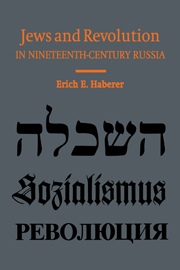Book contents
- Frontmatter
- Contents
- Preface
- 1 Introduction: The beginnings of Russian–Jewish radicalism, 1790–1868
- Part 1 The Chaikovskii circles: Jewish radicals in the formative stage of revolutionary Populism, 1868–1875
- Part 2 The Land and Freedom Party: Jews and the politicization of revolutionary Populism, 1875–1879
- 6 Jewish ‘generals of revolution’
- 7 The heresy of political terrorism
- Part 3 The Party of the People's Will: Jewish terrorists of socialist conviction, 1879–1887
- Appendix
- Abbreviations
- Notes
- Bibliography
- Index
7 - The heresy of political terrorism
Published online by Cambridge University Press: 22 January 2010
- Frontmatter
- Contents
- Preface
- 1 Introduction: The beginnings of Russian–Jewish radicalism, 1790–1868
- Part 1 The Chaikovskii circles: Jewish radicals in the formative stage of revolutionary Populism, 1868–1875
- Part 2 The Land and Freedom Party: Jews and the politicization of revolutionary Populism, 1875–1879
- 6 Jewish ‘generals of revolution’
- 7 The heresy of political terrorism
- Part 3 The Party of the People's Will: Jewish terrorists of socialist conviction, 1879–1887
- Appendix
- Abbreviations
- Notes
- Bibliography
- Index
Summary
On 7 December 1877 Valerian Smirnov wrote to his wife, Rosaliia Idelson, that he had received information from Russia to the effect that ‘the “rebels” (Arkadii is now their general) are… beginning to explain that one must first fight for a political programme’. The ‘rebels’ were of course the Zemlevoltsy, and their ‘general’ was none other than Aron Zundelevich. Ever since the formation of Zemlia i Volia the Lavrovists had watched with apprehension its growing political radicalization. Horrified by this development, Peter Lavrov told German Lopatin as early as March 1877: ‘… everyone's spirit has sunk a lot, and many think that the road to social revolution lies only through a constitution, and that they [the Zemlevoltsy] must help the constitutionalists. Horror!’ Zundelevich, who stood behind this ‘horror’, drew his own conclusions. On 30 December 1877 he notified a leading Lavrovist: ‘I still regard you and your friends as my comrades in general, but not in a narrow sense of the term … You refuse to understand that Russia is a country where nothing else can be done but putsches.’
For accuracy's sake it should be noted that Zundelevich was only one of the ‘generals’ in Zemlia i Volia, and that, except for him, there were as yet no Zemlevoltsy who in 1877 explicitly advocated ‘constitution’. The other ‘generals’ at the time were Olga Shleisner-Natanson and Aleksei Oboleshev who actually administered Zemlia i Volia with the help of such outstanding activists as Aleksandr Mikhailov. Leading the party in the spirit of Natanson, they were not insensitive to its political nature.
- Type
- Chapter
- Information
- Jews and Revolution in Nineteenth-Century Russia , pp. 146 - 170Publisher: Cambridge University PressPrint publication year: 1995



